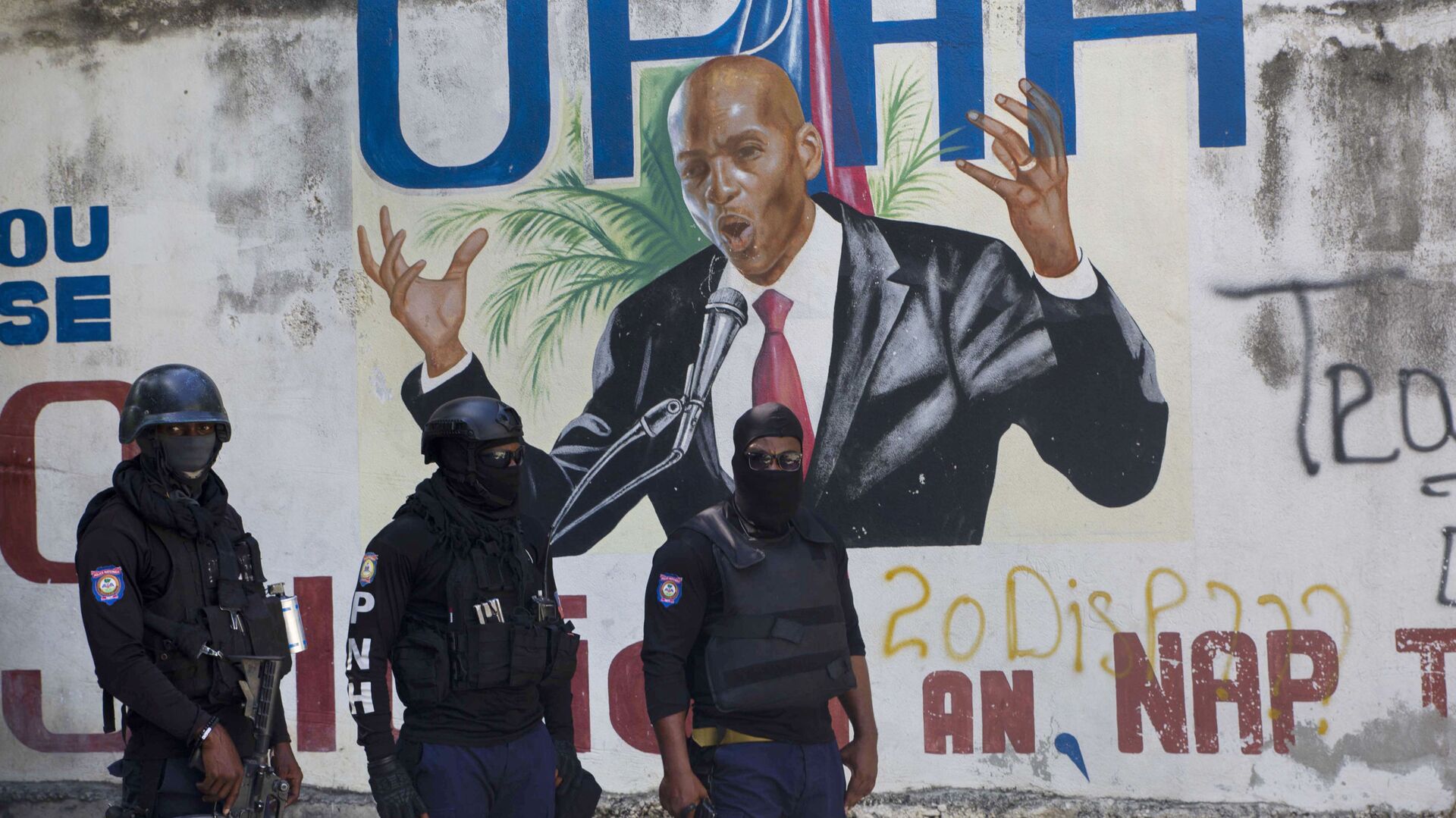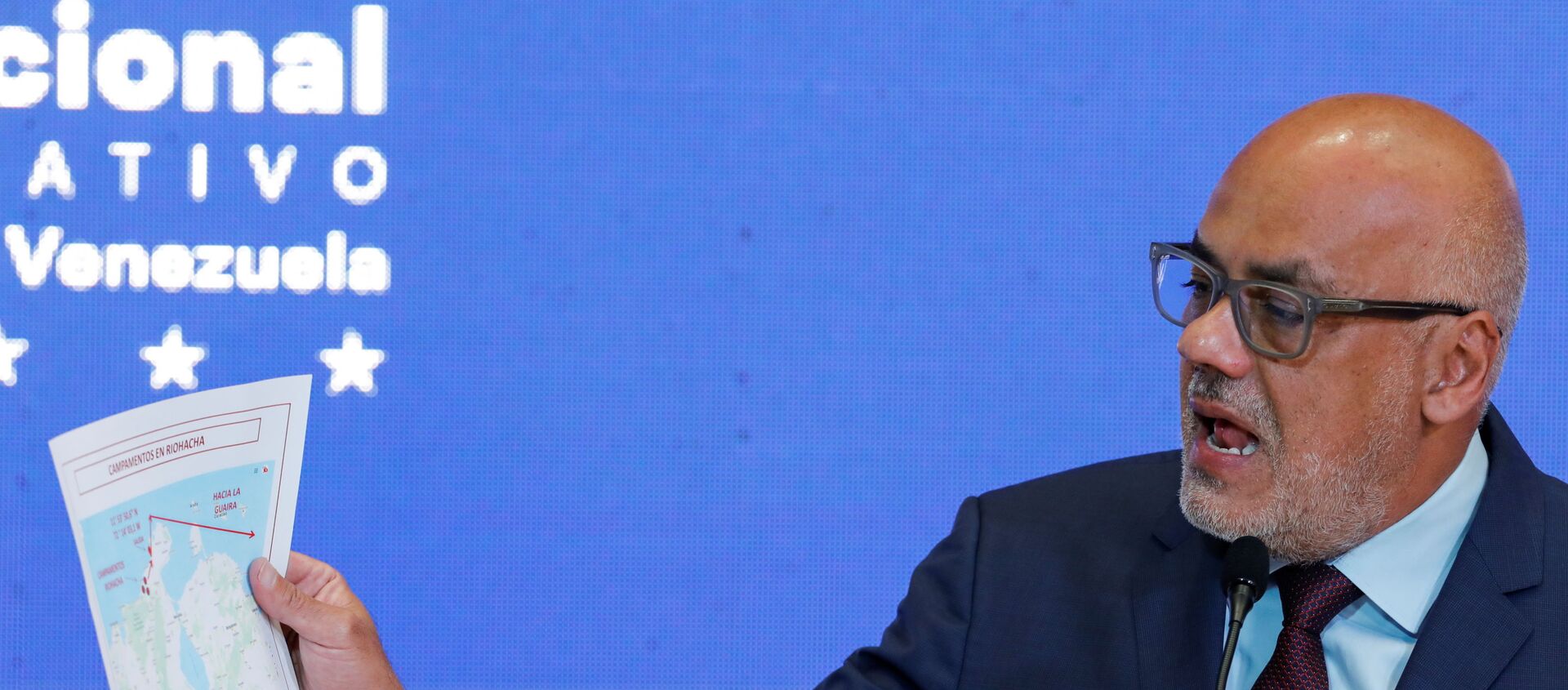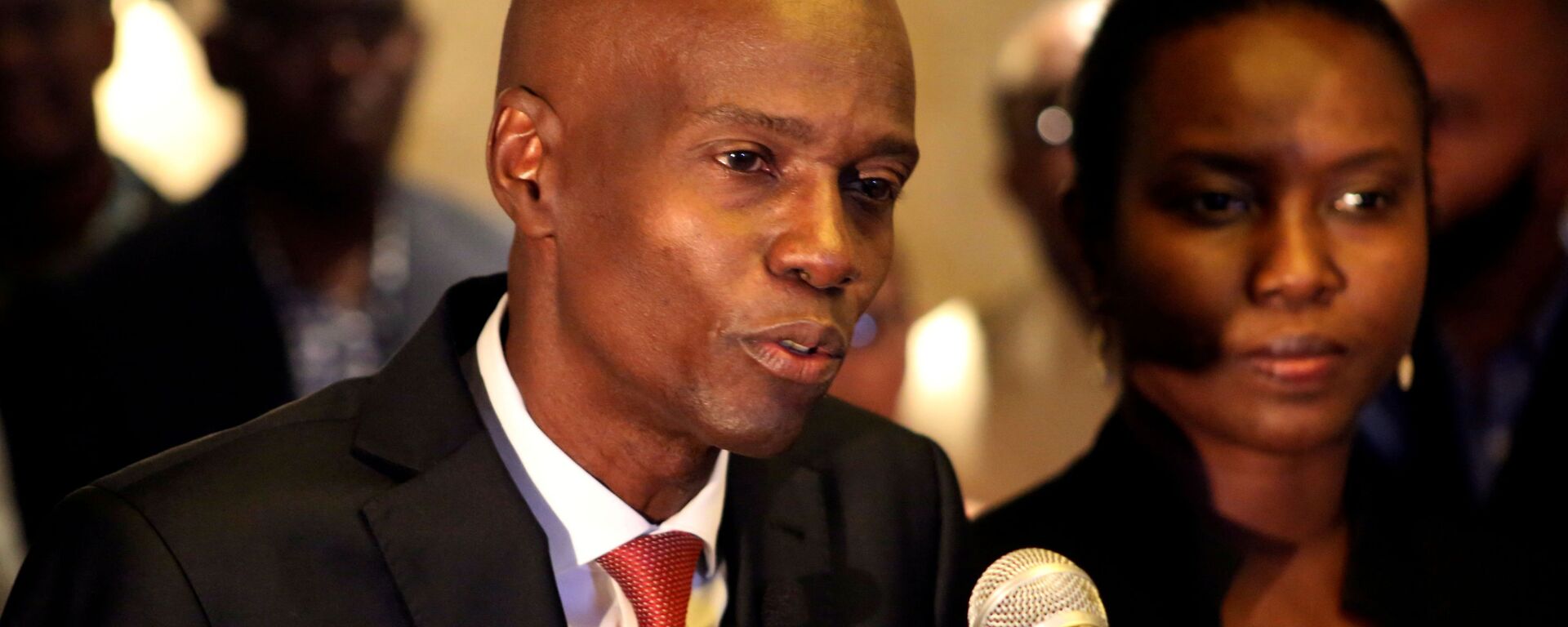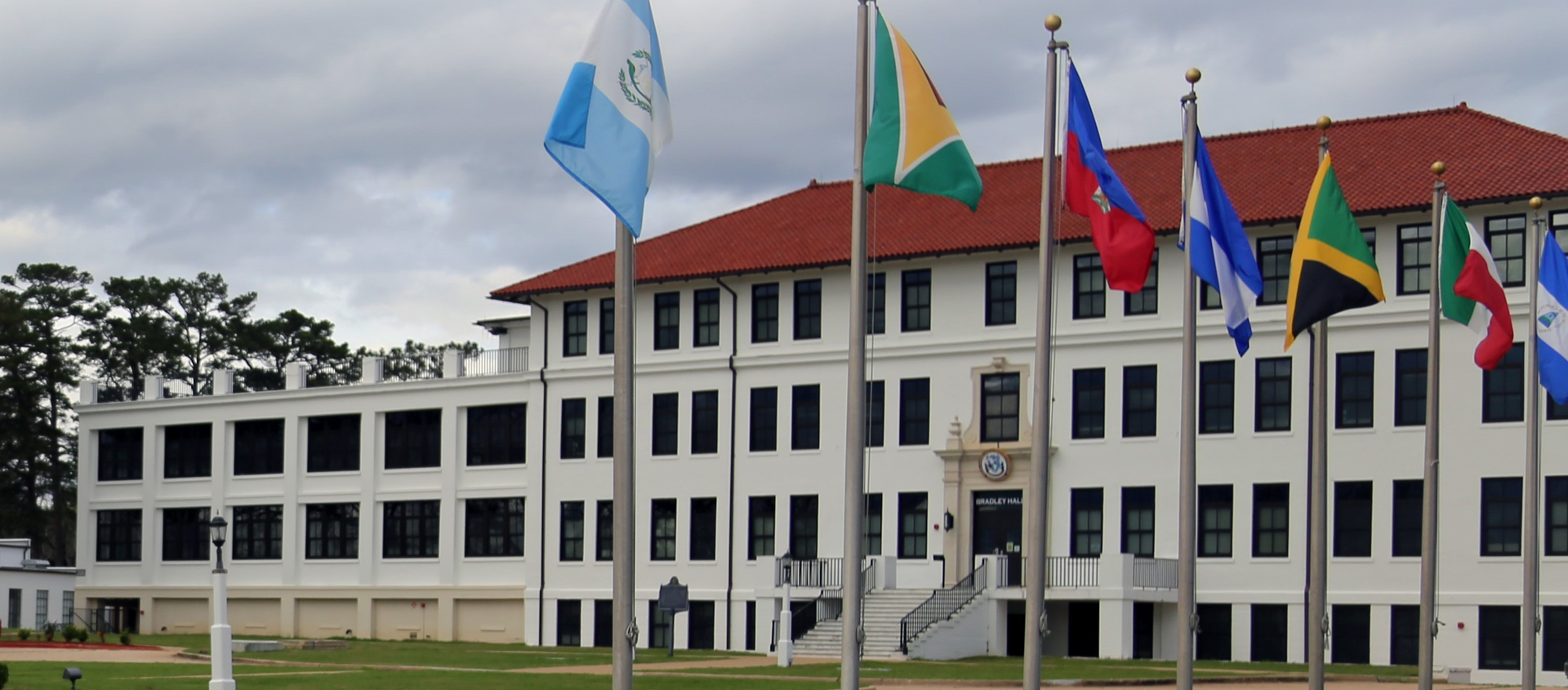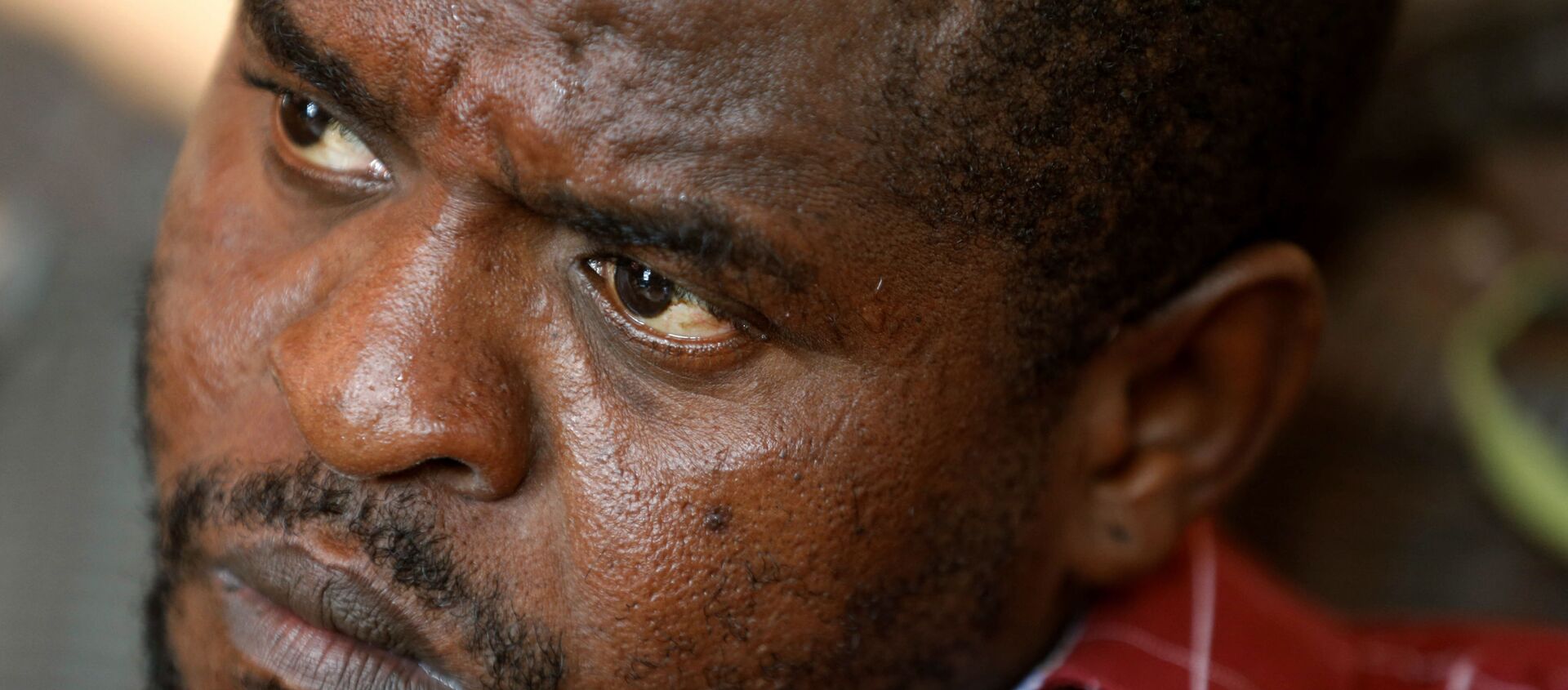https://sputnikglobe.com/20211218/we-were-useful-idiots-haitian-presidents-suspected-assassins-claim-they-were-framed-1091633289.html
‘We Were Useful Idiots’: Haitian President’s Suspected Assassins Claim They Were Framed
‘We Were Useful Idiots’: Haitian President’s Suspected Assassins Claim They Were Framed
Sputnik International
At least 44 suspects, including 18 Colombian nationals and at least three US citizens, were detained on suspicion of involvement in the brutal 7 July... 18.12.2021, Sputnik International
2021-12-18T20:31+0000
2021-12-18T20:31+0000
2022-08-06T11:17+0000
venezuela
haiti
america
assassination
alleged assassins
jovenel moise
colombia
https://cdn1.img.sputnikglobe.com/img/07e5/07/07/1083332924_0:228:2831:1820_1920x0_80_0_0_225eedb64cea6a628b79d822ca3ad592.jpg
Five Colombian nationals being held in a Haitian prison on suspicion of involvement in the murder of the country’s president have come forward to claim they are innocent, and to allege they were “framed” by the real killers.All five of the interviewed men are ex-soldiers in the Colombian army, and claim they arrived in Haiti a month before Moïse’s murder to work for a shady US-based private security company known as CTU Security. The mercenaries were reportedly promised that they would be paid between $2,700 and $3,000 a month, but were never paid.In mid-July, Venezuelan National Assembly speaker Jorge Rodriguez revealed that CTU was also involved in an assassination plot against Venezuelan President Nicolas Maduro in 2018. According to the official, the same company was also involved in Operation Gideon – the bizarre botched May 2020 operation involving Venezuelan dissidents and US mercenaries operating out of Colombia which attempted to sneak into Caracas, kidnap Maduro and fly him back to the US for prosecution on trumped-up drug charges.“We were told that we were going to provide security for a Haitian presidential candidate. We had no idea what was going to happen,” one of the men interviewed by CNN said.Involved But Not InvolvedAfter arriving in Haiti, the suspects and over a dozen other Colombian nationals were stationed in a compound in Port-au-Prince near the president’s villa. The interviewees admitted to being part of the convoy that traveled to Moïse’s home on the night of the murder, but insisted that they were not involved in the killing itself. The men declined to elaborate on the extent of their involvement, citing a lack of legal representation.After Moïse’s death, the five men were transported out of the presidential compound, fled to an empty building during a Haitian security sweep, and then made their way to the Taiwanese Embassy (Haiti is one of 14 UN members still officially recognizing the Chinese island’s status as a separate country).Taiwanese officials claim a group of 11 mercenaries forcibly entered its Port-au-Prince embassy following the Haitian president’s killing.These individuals later turned themselves in to the authorities, and according to the five interviewed men, faced beatings, stabbings and torture, were deprived of food, and faced threats against their families. The men said they were forced to sign documents in French which they didn’t understand, with security officers reportedly writing their statements for them. Haitian authorities maintain that translators were on hand and clarified what the suspects were signing.The five suspects have yet to be formally charged, and claim the only legal representation they have been offered has been junior apprenticing lawyers who don’t speak Spanish.“At no point has someone looked me in the face and said, ‘This is why you are here.' We obviously know why we’re in here but there is no rule of law or due process here. Everyone should be innocent until proven guilty and we all have rights to legal representation,” one prisoner complained.“The best thing that could happen is that this is brought to an international tribunal. When I am out of this country, I will tell the world everything I know,” one of the men promised.Murder MysteryHaitian police identified a total of 26 Colombians and two American nationals they said were linked to President Moïse’s brutal 7 July assassination, during which he was shot 12 times. Moïse’s wife, first lady Martine Marie Etienne Moïse, was also heavily wounded in the attack, and believes she survived only because the Spanish-speaking mercenaries who stormed the presidential residents took her for dead. In August, she called on the United Nations Security Council to help Haiti find those responsible for her husband’s murder.Three of the Colombians involved in the assassination were killed during the manhunt undertaken after Moïse’s murder, and police recovered a large stash of weapons and other materials used by the assailants. Two of the US nationals thought to be involved claimed that they were translators, and insisted that the mercenaries were supposed to arrest Moïse, not kill him. These claims have not been corroborated.The intrigue surrounding the Haitian president’s death deepened after Venezuelan media reported that a private jet that was used to transport some of the mercenaries into Haiti was also used to fly self-proclaimed Venezuelan ‘interim president’ Juan Guaido around for negotiations. In late July, the Pentagon also confirmed that seven of the Colombians arrested had received training at a US academy.The assassination put the impoverished nation in a state of martial law. Moïse was killed ahead of the expected 26 September presidential and legislative elections, which were to coincide with a referendum on a new constitution. These were postponed following the provisional electoral council by acting Prime Minister Ariel Henry.Moïse’s political leanings and international affiliations added another layer of complexity to his death. Unlike Venezuela’s Maduro or Cuba’s Castro, the businessman-turned-politician was not known to have any qualms with Washington. His liberal center-right Haitian Tel Kale Party attracted criticism for alleged large-scale corruption schemes involving the Clinton Global Initiative following Haiti’s devastating 2010 earthquake. The US State Department supported him to the hilt in his spat with Haiti’s Superior Judicial Council about whether he could stay on as president until February 2022 after his term formally expired in February 2021.Former Haitian police officer-turned G9 gang federation leader Jimmy “Barbecue” Cherizier has characterized the president’s killing as a “national and international conspiracy” against Haiti involving business elites, opposition figures and the police.
https://sputnikglobe.com/20210713/company-involved-in-haitian-presidents-murder-plotted-to-assassinate-maduro-in-2018-caracas-says-1083378936.html
https://sputnikglobe.com/20210803/-someone-gave-the-order-haiti-presidents-widow-seeks-uns-help-to-find-her-husbands-assassins-1083514599.html
https://sputnikglobe.com/20210723/pentagon-confirms-seven-colombians-arrested-for-moises-murder-trained-at-us-armys-whinsec-school-1083443107.html
https://sputnikglobe.com/20210712/who-are-barbecue-and-el-coqui-and-why-are-their-gangs-involved-in-violence-iin-venezuela-and-haiti-1083366978.html
venezuela
haiti
colombia
Sputnik International
feedback@sputniknews.com
+74956456601
MIA „Rosiya Segodnya“
2021
News
en_EN
Sputnik International
feedback@sputniknews.com
+74956456601
MIA „Rosiya Segodnya“
Sputnik International
feedback@sputniknews.com
+74956456601
MIA „Rosiya Segodnya“
venezuela, haiti, america, assassination, alleged assassins, jovenel moise , colombia
venezuela, haiti, america, assassination, alleged assassins, jovenel moise , colombia
‘We Were Useful Idiots’: Haitian President’s Suspected Assassins Claim They Were Framed
20:31 GMT 18.12.2021 (Updated: 11:17 GMT 06.08.2022) At least 44 suspects, including 18 Colombian nationals and at least three US citizens, were detained on suspicion of involvement in the brutal 7 July assassination of Haitian President Jovenel Moïse. The motives for the murder have yet to be uncovered. US President Joe Biden said he was “shocked and saddened” by Moïse’s death.
Five Colombian nationals being held in a Haitian prison on suspicion of involvement in the murder of the country’s president have come forward to claim they are innocent, and to allege they were “framed” by the real killers.
“We were useful idiots for someone else. But we did not commit this crime,” one of the men told CNN, with the news network allowed to interview the prisoners after months of negotiations with the authorities.
All five of the interviewed men are ex-soldiers in the Colombian army, and claim they arrived in Haiti a month before Moïse’s murder to work for a shady US-based private security company known as CTU Security. The mercenaries were reportedly promised that they would be paid between $2,700 and $3,000 a month, but were never paid.
In mid-July, Venezuelan National Assembly speaker Jorge Rodriguez revealed that CTU was also involved in an assassination plot against Venezuelan President Nicolas Maduro in 2018. According to the official, the same company was also involved in Operation Gideon – the bizarre botched May 2020 operation involving Venezuelan dissidents and US mercenaries operating out of Colombia which attempted to sneak into Caracas, kidnap Maduro and fly him back to the US for prosecution on trumped-up drug charges.
“We were told that we were going to provide security for a Haitian presidential candidate. We had no idea what was going to happen,” one of the men interviewed by CNN said.
Involved But Not Involved
After arriving in Haiti, the suspects and over a dozen other Colombian nationals were stationed in a compound in Port-au-Prince near the president’s villa. The interviewees admitted to being part of the convoy that traveled to Moïse’s home on the night of the murder, but insisted that they were not involved in the killing itself. The men declined to elaborate on the extent of their involvement, citing a lack of legal representation.
“We are stuck in this prison. We have to stay here. I will scream out loud all that I know when I can leave here but while we are here, we are terrified of reprisals,” one of the suspects said. “I am scared for what they might do to me but also for what they might do to my family,” another said, noting that he had been shown photos of members of his family back in Colombia.
After Moïse’s death, the five men were transported out of the presidential compound, fled to an empty building during a Haitian security sweep, and then made their way to the Taiwanese Embassy (Haiti is one of 14 UN members still officially recognizing the Chinese island’s status as a separate country).
Taiwanese officials claim a group of 11 mercenaries forcibly entered its Port-au-Prince embassy following the Haitian president’s killing.
These individuals later turned themselves in to the authorities, and according to the five interviewed men, faced beatings, stabbings and torture, were deprived of food, and faced threats against their families. The men said they were forced to sign documents in French which they didn’t understand, with security officers reportedly writing their statements for them. Haitian authorities maintain that translators were on hand and clarified what the suspects were signing.
“The real people responsible for this are outside of the prison and we’re stuck in here. We were cheated, framed, and scammed,” one of the men said.
The five suspects have yet to be formally charged, and claim the only legal representation they have been offered has been junior apprenticing lawyers who don’t speak Spanish.
“At no point has someone looked me in the face and said, ‘This is why you are here.' We obviously know why we’re in here but there is no rule of law or due process here. Everyone should be innocent until proven guilty and we all have rights to legal representation,” one prisoner complained.
“The best thing that could happen is that this is brought to an international tribunal. When I am out of this country, I will tell the world everything I know,” one of the men promised.
Haitian police identified a total of 26 Colombians and two American nationals they said were linked to President Moïse’s brutal 7 July assassination, during which he was shot 12 times. Moïse’s wife, first lady Martine Marie Etienne Moïse, was also heavily wounded in the attack, and believes she survived only because the Spanish-speaking mercenaries who stormed the presidential residents took her for dead. In August, she called on the United Nations Security Council to help Haiti find those responsible for her husband’s murder.
Three of the Colombians involved in the assassination were killed during the manhunt undertaken after Moïse’s murder, and police recovered a large stash of weapons and other materials used by the assailants. Two of the US nationals thought to be involved claimed that they were translators, and
insisted that the mercenaries were supposed to arrest Moïse, not kill him. These claims have not been corroborated.
The intrigue surrounding the Haitian president’s death deepened after Venezuelan media
reported that a private jet that was used to transport some of the mercenaries into Haiti was also used to fly self-proclaimed Venezuelan ‘interim president’ Juan Guaido around for negotiations. In late July, the Pentagon also
confirmed that seven of the Colombians arrested had received training at a US academy.
The assassination put the impoverished nation in a state of martial law. Moïse was killed ahead of the expected 26 September presidential and legislative elections, which were to coincide with a referendum on a new constitution. These were postponed following the provisional electoral council by acting Prime Minister Ariel Henry.
Moïse’s political leanings and international affiliations added another layer of complexity to his death. Unlike Venezuela’s Maduro or Cuba’s Castro, the businessman-turned-politician was not known to have any qualms with Washington. His liberal center-right Haitian Tel Kale Party attracted criticism for alleged
large-scale corruption schemes involving the Clinton Global Initiative following Haiti’s devastating 2010 earthquake. The US State Department supported him to the hilt in his spat with Haiti’s Superior Judicial Council about whether he could stay on as president until February 2022 after his term formally expired in February 2021.
Former Haitian police officer-turned G9 gang federation leader Jimmy “Barbecue” Cherizier has characterized the president’s killing as a “national and international conspiracy” against Haiti involving business elites, opposition figures and the police.
